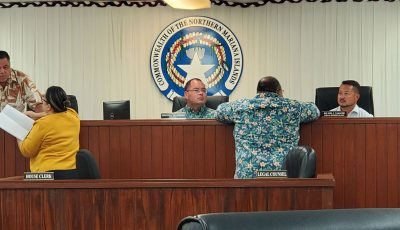Hofschneider declines House clerk’s 30-day extension request
Saying she was only given 48 hours to correct the deficiencies the Senate clerk had found in the House of Representatives Impeachment Record, House clerk Linda B. Muña requested yesterday for a 30-day extension to have the deficiencies remedied. Senate President Jude U. Hofschneider (R-Tinian), however, took that as “insulting,” noting that the House was given 25 days to submit a simple and easy-to-follow format.
In a letter yesterday to Muña, Hofschneider said the Senate will proceed with the impeachment process as required by the Impeachment Rules.
Hofschneider said any requests made to him as the presiding officer of these impeachment proceedings in the case against Gov. Ralph DLG Torres should cite the appropriate provision in the Impeachment Rules that would permit the action requested.

Hofschneider
In her request for extension, Muña said that fully complying with all requested changes within the 48 hours mandated by Impeachment Rule 9 is “simply not feasible.”
Last Monday, Senate clerk Dolores S. Bermudes informed Muña that her office had identified numerous deficiencies in the official House Impeachment Record.
The House Impeachment Record was transmitted to the office of the Senate clerk last March 24. Bermudes said that, pursuant to the Impeachment Rules, Muña has 48 hours, or yesterday, to correct the identified deficiencies.
Muña then wrote to Bermudes requesting an extension of 30 days to correct the deficiencies. Bermudes replied yesterday that she does not have the authority to consider or grant Muña’s request, that it should be addressed to Hofschneider in accordance with the Impeachment Rules.
The Senate clerk advised Muña that, at this point, the deadline to correct the deficiencies is still 48 hours from the date and time she received the letter, which is 4:54pm Wednesday, April 6.
In her request for extension, Muña said notwithstanding the language in the Impeachment Rules that the Senate clerk “shall promptly notify the House clerk,” the Senate, with the assistance of Legislative Bureau staff, took 11 calendar days, or 264 hours, to produce a list of objections to the record.
By contrast, Muña said, she only has 48 hours to correct these deficiencies, which would entail rearranging thousands of documents from dozens of disparate sources.
“This is an unreasonable and unfair burden for me to complete within such a short time span. Further, I have concerns about some of the requested changes,” Muña said.
She said it would distort the nature of the record to rearrange documents within the tranches submitted to the House Judiciary and Governmental Operations Committee.
For example, Muña said, the tranche of over 1,000 pages of documents related to travel authorizations subpoenaed from police officer Joey Cruz is not in chronological order because it was not submitted by Cruz in chronological order.
Muña also cited that some documents were scanned and entered into the record in the order in which they arrived, and were typically not arranged in any systematic order when provided to the House.
“It was a mammoth task to organize these documents and compile them into a searchable record as we did, and I maintain that the record I transmitted on March 24, 2022, was in substantial compliance with [Impeachment] Rule 9,” she said.
Still, Muña said, she would be willing to undertake the challenge to make a good faith effort to correct the identified issues if given enough time and resources to do so. She said her office will endeavor to correct typographical errors, adjust the consecutive pagination of documents, and arrange documents in chronological order to the extent possible.
In denying Muña’s request for extension, Hofschneider said there is no provision in the Senate Rules of Impeachment that permit the extension of this deadline. Hofschneider said the House has been given ample time to provide a record organized in the manner prescribed by the Rules of Impeachment.
The Senate president said t
To imply by Muna’s letter that the Senate staff has taken an inordinate time to return the disorganized record to Muña, is, “frankly, an insult” at a time when the House clerk is requesting the Senate’s consideration, Hofschneider said.
He pointed out that the Senate Rules of Impeachment were presented and made available to the public last Feb. 28. He said that last March 3, the Senate voted and passed the Rules, and the House was required to provide the Impeachment Record by March 17. He said the deadline was extended at Muña’s request last March 24.
He said a further extension was available under Rule 9, which was not requested.
“In all, the House of Representatives was fully aware of the simple and easy-to-follow format required of the impeachment record for 25 days, 19 days of which were regular workdays,” Hofschneider said.
He said those rules required the impeachment record to be organized by three very simple concepts—consecutive pagination, a table of contents, and organized first by Article of Impeachment and second by chronological order.
The Senate president said Muña seems to find the organization by chronological order to be the most objectionable. Unfortunately, Hofschneider pointed out, the record as provided listed documents that were not present, had entire sections of documents that bore no page numbers, and seemed to be missing pages altogether.
“Perhaps if the documents had been organized chronologically prior to being paginated, it would have eliminated these more serious problems,” he said.



























